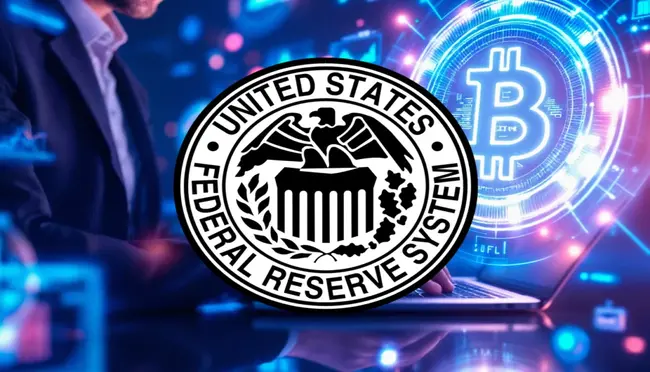Fed Executive Pushes for ‘De Minimis’ Crypto Ownership Among Central Bank Employees
0
0

Highlights:
- A top Fed executive is pushing for ‘de minimis’ crypto ownership for Central Bank staff.
- Michelle Bowman says easing restrictions will help the Federal Reserve attract skilled staff with crypto expertise.
- The Fed aligns with OCC and FDIC by removing reputational risk and focusing on measurable financial exposure.
Federal Reserve Vice Chair for Supervision Michelle Bowman said staff at the central bank should be allowed to own small amounts of cryptocurrency. She made the remarks on Tuesday during a blockchain event in Wyoming. Bowman argued that direct exposure would help employees gain a practical understanding of digital assets.
JUST IN:
Fed's Vice Chair Bowman proposes allowing central bank staff to own small amounts of crypto, as banks increasingly explore #Bitcoin and other digital assets. pic.twitter.com/XrmE3bsqln
— Bitcoin.com News (@BTCTN) August 19, 2025
At present, the Federal Reserve bans its staff and their spouses from holding or trading cryptocurrencies. The Federal Open Market Committee introduced the restriction in 2022 and extended it to cover crypto investments. Bowman believes the current rules limit the ability of employees to understand new technologies that shape financial markets.
She explained that learning from books and research cannot replace hands-on experience. “I certainly wouldn’t trust someone to teach me to ski if they’d never put on skis,” Bowman said. She stressed that allowing de minimis holdings would not create conflicts of interest but would instead provide useful insights for oversight.
Bowman noted that direct involvement could improve the central bank’s ability to supervise risks and benefits in crypto markets. She added that a careful allowance of small holdings would strengthen knowledge within the institution and enhance decision-making on policy related to digital assets.
Fed Executive Pushes for ‘De Minimis’ Crypto Ownership and Urges Minimal Restrictions
Bowman also pressed for easing the investment restrictions that apply to Federal Reserve staff. She said the current rules make it harder to hire and retain people with expertise in blockchain and crypto. According to her, removing these barriers would strengthen the workforce and improve its capacity to engage with complex technology.
The Federal Reserve tightened its investment rules after disclosures of unusual trading activities by senior officials during the pandemic. Bowman said those measures protected integrity but argued that the limits now prevent regulators from building necessary skills. She added that the Fed risks falling behind if it cannot attract professionals who understand emerging financial systems.
Bowman also pointed to tokenization as one of the most promising uses of blockchain. She explained that tokenized assets allow a transferor to pass ownership without changing a custodian or moving physical security. She argued that such solutions reduce inefficiencies and improve transaction processes.
Furthermore, Bowman said the Fed must avoid an approach that isolates it from innovation. She warned that excessive caution could erode relevance, as new systems will continue to advance regardless of regulatory positions. She added that the central bank must choose to engage with these technologies or risk losing influence over their adoption.
In a related development, the Federal Reserve announced recently that it will discontinue a program established in 2023 to supervise certain crypto-related activities. In a notice, it said it will phase out the initiative and return to reviewing these activities through its standard oversight process.
U.S. Federal Reserve Ends Crypto Supervision Program
The Fed officially discontinued its "Novel Activities Supervision Program," which had heightened scrutiny on banks' crypto activities. This shift returns oversight to standard regulators, potentially easing barriers for banks…
— nubs_gg (@web3nubs) August 19, 2025
Bowman Warns Against Standing Still on Blockchain
Bowman urged regulators to move away from skepticism and embrace innovation. She warned that standing still would allow blockchain and digital assets to bypass the traditional financial sector. She said the industry should engage with regulators and provide education that builds knowledge of blockchain applications.
Bowman explained that risks exist with any rapid transformation. However, she said those risks may be balanced by benefits such as efficiency, speed, and transparency. She added that regulators should weigh both sides rather than dismiss new approaches entirely.
The Federal Reserve recently aligned with the Office of the Comptroller of the Currency and the FDIC by revising its supervision manuals. Examiners will no longer consider reputational risk and will now focus strictly on measurable financial exposure.
Best Crypto Exchange
- Over 90 top cryptos to trade
- Regulated by top-tier entities
- User-friendly trading app
- 30+ million users
eToro is a multi-asset investment platform. The value of your investments may go up or down. Your capital is at risk. Don’t invest unless you’re prepared to lose all the money you invest. This is a high-risk investment, and you should not expect to be protected if something goes wrong.
0
0
 Manage all your crypto, NFT and DeFi from one place
Manage all your crypto, NFT and DeFi from one placeSecurely connect the portfolio you’re using to start.






